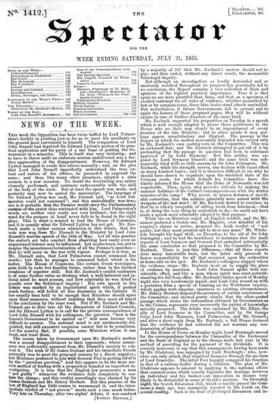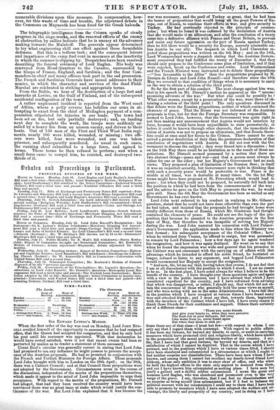MEWS OF THE WEEK.
This week the Opposition has been twice baffled by Lord Palmer- ston's facility in yielding just so far as to meet his assailants on the ground most convenient to himself. The resignation of Lord John Russell had deprived Sir Edward Lytton's motion of its prac- tical application and his party of a fair hope of putting the Go- vernment in a minority. This in itself was very irritating ; and to have to throw aside an elaborate oration undelivered was a fur- ther aggravation of the disappointment. However, Sir Edward Lytton managed to evade this odious necessity ; and, on the plea that Lord John Russell imperfectly understood the tree ex- tent and nature of his offence, he proceeded to expound the same ; and thus, like many other preachers, adapted a stale sermon to a new occasion. No doabt the dovetailing was rather clumsily performed, and contrasts unfavourably with the skill of the body of the work. But at least the speech was made, and posterity may now be spared the manuscript. The language of Sir Edward Lytton was such, Mr. Disraeli said, " as Lord Pal- merston could not command"; and this undoubtedly was true; nor is it probable that the Premier would envy the Parliamentary sue as of.6 orator thus contrasted with him. Lord Palmerston 's 'words are neither very ready nor very brilliant; but the right word for-the purpose in hand. never fails to be found in the right place. This is what is wanted to lead the House of Commons, and it is exactly what Sir Edward Lytton has not got. Mr. Roe- brick -made a rather curious admission in this debate, that his vote was wan' from Mr. Disraeli to. the Ministry by Lord John Russell's warlike speech of the 24th of May. Let all who practise the orator's art take comfort from observing how easily even an experienced listener may be influenced. Let us also learn, too, not to despise the monotonous termination of all the Premier's speeches- thit he will carry On the war with 'vigour. Perhaps it is true, as Mr. Disraeli says, that Lord Palmerston cannot command fine words ; but then he manages to command belief, which is far better. • The House of Commons, like certain Greek worshipers, puts faith in rude but familiar forms, rather than in the finished creations -of Superior skill. But Mr. Roebuck's candid confession is of some further value as showing what a well-balanced and ju- dicial mind he must possess, and how admirably he was fitted to preside over the Sebastopol inquiry ! His own speech in this debate was marled by an inquisitorial spirit which, if pushed much further, will forbid all free discussion in the Cabinet. It has usually been held to be enough that Ministers should agree upon their measures, without insisting that they must all travel to the conclusion by the same road. But if Mr. Roebuck and Mr. Disraeli are to dive into all the discussions of Cabinet Councils, and Sir Edward Lytton' is to call for the private correspondence of Lord John Russell with his colleagues, the question "how is the Queen's Government to be carried on?" will soon become very difficult to answer. The national mind is not unrdasonably dis- auieted, but Still excessive suspicion cannot fail to be pernicious. Let the country find, if possible, some Ministers whom it can trust, and trust them.
The course taken by Government upon Mr. Roebuck's motion was a second disappointment to their opponents ; whose annoy- ance was sufficiently apparent from Mr. Disraeli's anxiety to con- ceal it. The wish of Sir James Graham and his immediate friends naturally was to meet the proposed censure by a direct negative; but kinisterspreferred to join with General Peel in getting rid of it by the " previous question." And this appears to be the more cor- rect method of dealing with a proposition founded on imperfect in- vestigation. It is true that the English law pronounces a man " not guilty" whenever the evidence fails completely to sus- tain the charge ; and this verdict accordingly was claimed by Sir James Graham and Mr. Sidney Herbert. But this practice of the law of England has little reason to recommend it, and the inter- mediate verdict of " not proven" meets such a case much better. Very late on Thursday, after two nights' debate; it was resolved by a majority of 107 that Mr. Roebuck's motion should not be put; and thus ended, without any direct result, the memorable Sebastopol inquiry. But although an investigation so loudly demanded and so anxiously watched throughout its progress has practically led to no conclusion, the Report contains a vast collection of facts and opinions of the highest practical importance. True it is that opinions are more plentiful than facts, and that as a specimen of exalted contempt for all rules of evidence, whether prescribed by law or by common-sense, those blue books stand almost unrivalled. But nevertheless, if future Governments fail to extract and to apply the lessons of those pregnant pages, they will be without excuse in case of further disasters of the same kind.
Mr. Roebuck supported his proposition on Tuesday in a speech which is well enough adapted to please those petitioners to the House who see their way clearly to an impeachment of every member of the late Ministry ; but to other minds it may i per- haps appear unsatisfactory and illogical. The passage n the Report on which the motion necessarily depended was carried only by Mr. Roebuck's own castin,,-vote in the Committee. This was an awkward fact; and Mr. Roebuck attempted to get rid of it by pretending that the passage in question had been in substance approved of by Lord Seymour. But this artifice was ex- posed by Lord Seymour himself; and the same trick was sub- sequently tried with as little success by Sir John Pakington. Mr. Roebuck, while his strength serves, can declaim with equal effect on many kindred topics; and it is therefore difficult to see why he should have chosen to expatiate upon the wretched state of the Crimean roads, for which default his Committee have dis- tinctly informed the House that the Duke of Newcastle was not responsible. Then, again, why provoke ridicule by making the summer holidays of the Cabinet contemporaneous with the winter miseries of the camp ? Why assert, in brazen defiance of inevit- able correction, that the soldier& generally were armed with -weapons of'llie last war 2- -41 Mr. Roebuck desired to convince us that he is utterly incapable of sifting truth from falsebood,—that is, of doing the 'very thing he undertook to do,—he could not have made a speech more admirably adapted to that purpose. While the ex-Ministers urged an English verdict, and the Mi- nisters- preferred a Scotch one, -Mr. lIagnike, ever mindful of his country's claims to notice, proposed the Irish verdict of "not guilty, but they must promise not to do so any more." Mr. White- side brought his legal skill, on Thursday, to the aid of Sir John. Pakington ; and he had the hardihood to maintain that the draft reports of Lord Seymour and General Peel embodied substantially the same conclusion as that proposed to the Committee by Mr. Roebuck. There is just this difference,—that -all three reports state many lamentable facts, but the latter only proceeds to fasten responsibility for all that occurred upon the authorities at home and on the spot. Mr. Roebuck's colleagues stopped where the evidence stops—Mr. Roebuck went on to supply the place of evidence by assertion. Lord John Russell spoke with con- siderable effect, and like a man whose spirit was erect notwith- standing his fall from office. Mr. Roebuck's bitter speech of Monday night was very handsomely repaid; and Lord John wound up with a quotation from a speech. of Canning on the Waleheren inquiry, which applies with singular exactness to existing circumstances. Mr. Sidney Herbert disputed the accuracy of certain conclusions of the Committee ; and showed pretty clearly that the often-quoted passage which states the information obtained by Government as to the Criniea, represents very incorrectly the extent of knowledge actually possessed. The debate was sustained by Mr. Ellice, the ally of Lord Seymour in the Committee, and by Sir George Grey, Lord John Manners, Lord Palmerston' and Mr. Disraeli; and after a short reply from Mr. Roebuck;' a full House declared that the evidence he had collected did not warrant any con- demnation of individuals.
In the House of Peers, on Monday night, Lord Monteagle moved for the correspondence between the Chancellor of the Exchequer and the Bank of England as to the change made last year in the method of providing for the payment of the dividends. It is scarcely necessary to say that this arrangement, having been made by Mr. Gladstone, was impugned by Lord Monteagle; who, how ever, can only attack that empirical financier through the medium of Lord Granville. The latter Peer happily compared his function
to that of a railway-buffer during, a collision. The plan of Mr. Gladstone appears to amount to applying to the national affairs
that common-sense which usually regulates the dealings between an individual and his bankeran innovation in finance very likely to be distasteful to some of its older masters. On Thursday
night, the Scotch Education Bill, which so hardly passed the Com- mons a week ago, was summarily rejected in the Lords on the second reading. Such is the fruit of prolonged discussion and in-
numerable divisions upon this measure. In compensation, how- ever for this waste of time and trouble, the adjourned debate in the bommons on Maynooth has been fixed for the Greek kalends.



























 Previous page
Previous page